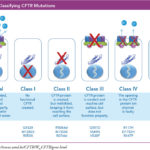 Although cystic fibrosis is considered to be a single disease, we have all observed the wide range of symptoms experienced by people living with CF. A chart contained in the CF Foundation’s recent report on CF registry data displays the five classes of the cystic fibrosis transmembrane conductance regulator (CFTR) defects that result from CF gene mutations. This common-language explanation provides a basic understanding of the CFTR variants. Click the image at the right to open a full-sized version of the chart.
Although cystic fibrosis is considered to be a single disease, we have all observed the wide range of symptoms experienced by people living with CF. A chart contained in the CF Foundation’s recent report on CF registry data displays the five classes of the cystic fibrosis transmembrane conductance regulator (CFTR) defects that result from CF gene mutations. This common-language explanation provides a basic understanding of the CFTR variants. Click the image at the right to open a full-sized version of the chart.
According to the Cystic Fibrosis Mutation Database, researchers have identified over 2,000 distinct CF mutations to date. The distribution of these mutations among the five classes helps to explain the variations in the type and severity of the symptoms experienced by people living with CF. It also explains the range of responses individuals get from the same treatments.
The individual classes have also been key in driving different avenues of research into new medicines and treatments. For example, Kalydeco (ivacaftor) is a new medication designed to treat individuals with mutations that fall within Class III. Because most individuals have Class II mutations, further research was conducted to develop Orkambi (lumacaftor in combination with ivacaftor) to extend the benefits to this broader population.
If you would like to dig deeper into this topic, two web sites offer access to detailed listings of CFTR mutations:
- CFTR1 – Cystic Fibrosis Mutation Database maintained by the Cystic Fibrosis Centre at the Hospital for Sick Children in Toronto – “[D]evoted to the collection of mutations in the CFTR gene for the international cystic fibrosis genetics research community…[t]he specific aim of the database is to provide up to date information about individual mutations in the CFTR gene.”
- CFTR2 – Clinical and Functional Translation of CFTR (CFRT2) sponsored by CF Foundation, Johns Hopkins Medicine and Sequenom Laboratories – “This website provides information about specific CF mutations only. This website is intended for members of the general public who want to find out what we currently know about specific mutations related to cystic fibrosis. This includes:
- Cystic fibrosis (CF) patients,
- Family members of CF patients,
- People who are carriers of a CF mutation, and
- Parents whose baby has just been diagnosed with CF through newborn screening.”
